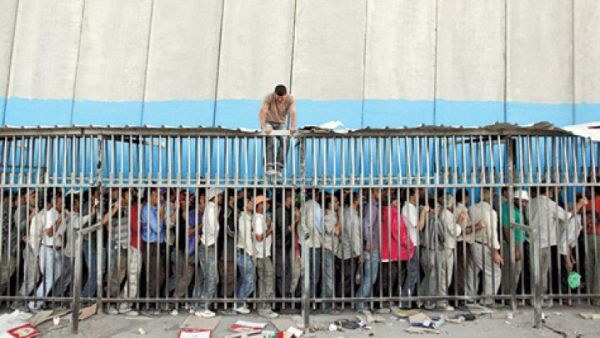The Israeli authorities in recent days have launched a massive crackdown on Palestinians working without permits in Israel, in a campaign critics have denounced as a political game that will only deepen Palestinian poverty.
Israeli police said Tuesday that in just two weeks they had rounded up more than 1,200 illegal Palestinian workers, while last week, Israel's parliament, the Knesset, passed into law a set of new penalties aimed at deterring their employment.
The crackdown follows a deadly attack in the Israeli port of Jaffa earlier this month carried out by a Palestinian who had illegally crossed the border out of the occupied West Bank.
Israeli Prime Minister Benjamin Netanyahu quickly called for the introduction of legislation against those who "employ, assist and house people who are present in Israel illegally," telling ministers at his weekly Cabinet meeting: "It must be understood that a large proportion of (Palestinian) attackers were present in Israel illegally or infiltrated into Israel illegally."
However, few Palestinians attackers were in fact workers in Israel, and the recent crackdown has been condemned by rights groups as a political game, unlikely to affect the violence, yet economically harmful to both Palestinians and Israelis.
Raja Zaatry, project manager for Palestinian workers at Kav LaOved, a workers' rights group in Israel, told Ma'an that Israeli policy had left most Palestinian laborers "politically passive" -- those with permits did not want to have them revoked, while those without did not want to draw attention to themselves.
"The Israeli government is using the issue of illegal workers to terrorize Israeli society, to tell them there is a security threat," he said. "It's a game of trying to make the racists happy."
'Human rights issue'
Last year, there were as many as 112,300 Palestinians employed in Israel and Israel's illegal settlements -- about 12 percent of the Palestinian workforce -- according to the Palestinian Central Bureau of Statistics (PCBS).
However, because Israel sets a tight quota for the number of Palestinians issued work permits, thousands are forced to enter Israel illegally, slipping through gaps in Israel's separation wall, seeking work with exploitative employers, and often living in Israel for long periods of time.
PCBS estimates that in 2015 there were as many as 36,400 illegal workers, although most of these were employed in the settlements.
B'Tselem said in a 2014 report: "For Palestinian workers who regularly enter Israel illegally to earn a living, life is a constant struggle for survival and returning home safe and sound from work cannot be taken for granted.
"They live in constant anxiety, fearing arrest or injury. In such a reality, labor rights such as a minimum wage, reasonable work hours, and a pension scheme seem like a distant dream."
B'Tselem spokesperson Sarit Michaeli told Ma'an these Palestinians entered Israel unlawfully not so they could carry out knife attacks, but because they had been driven by "immense poverty and a lack of employment" inside the occupied West Bank.
"When you look at the factors forcing Palestinian laborers unlawfully into Israel, you understand why it is a human rights issue," she said.
While Israel may be free under international law to seal its borders, she said its continued occupation of the Palestinian territory and its effective crippling of the Palestinian economy meant it was "obligated to find ways to bring Palestinian laborers into Israel."








